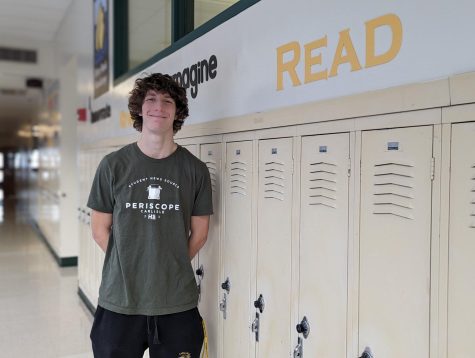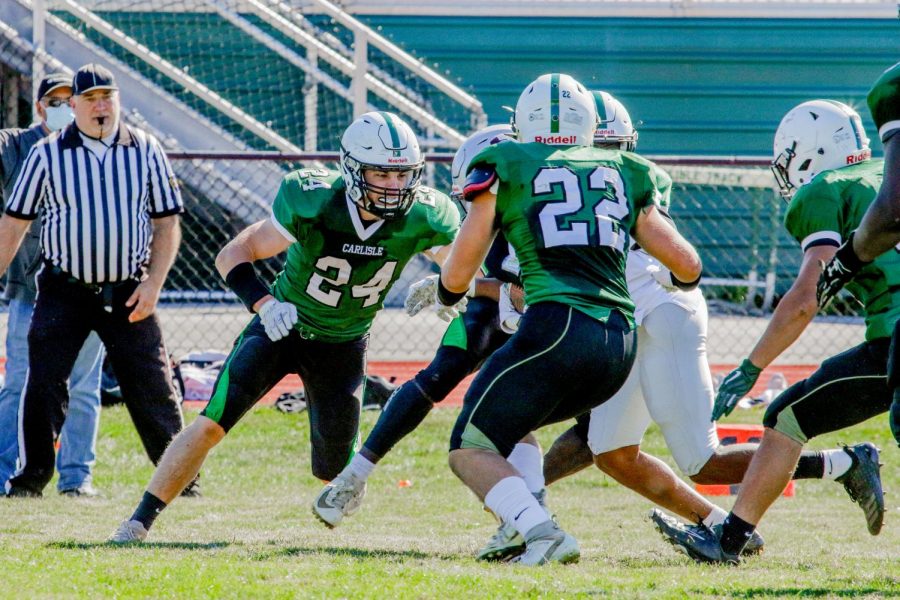Referees: the zebra-striped scapegoats of the sports world (Editorial)

More stories from Jarrett Wilson
EAGLED-EYED ONLOOKER: A referee waits to make a call as Carlisle’s Sean Smith rushes against Mechanicsburg. Officials have to deal with the constant pressure of correctly judging these contests without the assistance of video review.
For as long as I can remember, referees have been the easy target of the sports world’s blame, disgust and disappointment. After all, they are the ones that make the calls that can send the fans home packing with a smile or wondering if the outcome would be different if “that one call” went the other way.
But do they deserve this pressure?
Human error is a common occurrence during athletics, and this has become more of a debate in recent years as major league sports have started to stray away from human referees and incorporated more video reviews or Video Assistant Review (VAR), as professionals like to call it. This has allowed referees in professional sports leagues like the NFL, MLB, and NBA to be corrected for their missed calls.
VAR, of course, has its positives and negatives in professional sports, with the positives including getting more correct calls during a game.
However, is that really true?
A study done by the MLB in 2010 said out of 184 analyzed games 99.53% of the calls made by officials were correct. This statistic was taken 4 years before the league unanimously voted for MLB managers to be able to review every call made by umpires except balls and strikes.
Another professional sport that VAR is the NFL and since video review was introduced in 1999 only 38% of challenged plays have been overturned. So statistics show us professional officials usually get the call right and when they don’t they have assistance to fall back on, in VAR.
However what about non-professional or collegiate sports?
My thoughts on this are different for each level of sports. In lower levels like Little League, Midget Football, and other youth leagues, we should make it easier to become an official; having more eyes on the field of play could help eliminate the controversial side of youth sports, as making the right call in these leagues is not as essential as the players learning how to play safely and effectively.
After all, these officials at the youth level are being paid a set amount a game to uphold the safety of the players and maintain the integrity of the game. Youth officials also help in keeping the young athletes interested in the game and having fun.
For example, CHS junior Livi Myers told me that “during soccer season we had a referee that reminded us all of Santa. He had a big stomach and a white beard. He would stand on the sidelines and joke with us sometimes and helped make the game fun.”
Referees like this allow kids to build a love for their game that can grow the rest of their life.
The tricky situation, in this case, is when it comes to high school sports, I think that instead of worrying about having an abundance of officials, we should make sure the tests and the evaluation process of becoming an official is getting the most qualified people in there to make the calls.
Another option that people like to ask for and what seems like the most logical option is video review at the high school level. However, I feel this is not a logical or realistic alternative. High schools do not have the proper resources to provide reliable VAR.
For example, the review system in the MLB has a headquarters in New York. A headquarter like this is near impossible at the high school level, especially for all of the different sports that happen across the nation.
Another problem that arises is the feasibility of having cameras at high school events. The budget for having the quality of camera that is necessary to make the right call and having the manpower to showcase those angles and pay those workers is near impossible to expect of every high school.
One other thing you need to think about: Are high school officials being paid to make the correct calls or to maintain the integrity of the game and keep the players safe?
CHS senior Andrew Swidler said, “When I played baseball, I thought it was interesting because the umpires were really nice and always made the game run smoothly. The games were always fun and I enjoyed playing with two well-trained umpires that made good calls for both teams.”
I agree with Andrew one hundred percent that having well-trained umpires will help the game run smoothly and make it more enjoyable for the players and that is what’s important.
I believe that Video Review is a great tool for officials to utilize during professional sports games and professional sports games only. The officials that are hired and paid in lower-level competition should be looked at as administrators of the game rather than perfectionists judging the play of the field. We as fans need to have trust in officials that they have the proper credentials and knowledge to be there on the field making the calls.
As Rob Urban, CHS physics teacher, an assistant coach on the wrestling team, and a local football official said, “ I think an important thing is for the fans and the athletes to have trust in the officials that they have the proper knowledge. I know some of the football officials that I work with have been doing it for 10 plus years so we know the rules and know what we are doing.”
Disclaimer: Articles designated as “Editorial” represent the views and opinions of the author, not the 2020-2021 Periscope staff, CHS/CASD administration, or the CHS student body.
Want to help the Herd? Please consider supporting the Periscope program. Your donation will support the student journalists of CHS and allow us to purchase equipment, send students to workshops/camps, and cover our annual website hosting costs.

Jarrett is a senior at Carlisle High School. He enjoys being very active outside of school, he plays three sports for the Herd and is a member of senior...





























































































Michael • Dec 13, 2021 at 1:28 pm
This artical was well stated Refs are really the blame of almost every losing team.
Jack Merriam • Nov 1, 2021 at 1:45 pm
I definitely agree that, warranted or not, refs serve as an outlet for the anger of the fans.